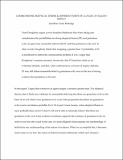Files in this item
Commonsense, skeptical theism, and different sorts of closure of inquiry defeat
Item metadata
| dc.contributor.author | Rutledge, Jonathan | |
| dc.date.accessioned | 2017-01-23T17:30:12Z | |
| dc.date.available | 2017-01-23T17:30:12Z | |
| dc.date.issued | 2017 | |
| dc.identifier | 248986146 | |
| dc.identifier | 4c1966c6-8d0c-4642-ab9b-2b5d4684a2c7 | |
| dc.identifier | 85014452163 | |
| dc.identifier | 000401420000002 | |
| dc.identifier.citation | Rutledge , J 2017 , ' Commonsense, skeptical theism, and different sorts of closure of inquiry defeat ' , Faith and Philosophy , vol. 34 , no. 1 , pp. 17-32 . https://doi.org/10.5840/faithphil201712576 | en |
| dc.identifier.issn | 2153-3393 | |
| dc.identifier.other | ORCID: /0000-0002-9521-8031/work/54516638 | |
| dc.identifier.uri | https://hdl.handle.net/10023/10162 | |
| dc.description.abstract | Trent Dougherty argues (contra Jonathan Matheson) that when taking into consideration the probabilities involving skeptical theism (ST) and gratuitous evils, an agent may reasonably affirm both ST and that gratuitous evils exist. In other words, Dougherty thinks that assigning a greater than .5 probability to ST is insufficient to defeat the commonsense problem of evil. I argue that Dougherty’s response assumes, incorrectly, that ST functions solely as an evidential defeater, and that, when understood as a closure of inquiry defeater, ST may still defeat reasonable belief in gratuitous evils, even in the face of strong evidence that gratuitous evils exist. | |
| dc.format.extent | 212854 | |
| dc.language.iso | eng | |
| dc.relation.ispartof | Faith and Philosophy | en |
| dc.subject | B Philosophy (General) | en |
| dc.subject | T-NDAS | en |
| dc.subject.lcc | B1 | en |
| dc.title | Commonsense, skeptical theism, and different sorts of closure of inquiry defeat | en |
| dc.type | Journal article | en |
| dc.contributor.institution | University of St Andrews. School of Divinity | en |
| dc.identifier.doi | https://doi.org/10.5840/faithphil201712576 | |
| dc.description.status | Peer reviewed | en |
This item appears in the following Collection(s)
Items in the St Andrews Research Repository are protected by copyright, with all rights reserved, unless otherwise indicated.

